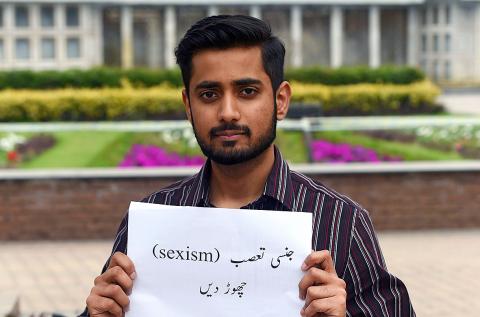“Anything you can do I can do while bleeding,” read one defiant poster at a recent women’s march in Pakistan, while another demanded: “Keep your dick pics to yourself.” Then came the backlash, including rape and death threats.
The posters were just part of the colorful spectacle as tens of thousands of women took to the streets for the second annual Aurat (Women) march in major cities across Pakistan, marking International Women’s Day on March 8.
But this year the slogans caught the attention of the media, many of whom showcased them online, while a handful of the most provocative went viral — igniting weeks of outrage, with shocked organizers reposting a slew of violent threats.

Photo: AFP
The uproar has provoked a rare and at times acrimonious debate on women’s rights and cultural values in a conservative Muslim country that has, until now, been largely unconcerned with the global #MeToo movement. Celebrities and television personalities have weighed in, and a retaliatory “Men’s March” was even organized in Karachi, though reports suggest just two showed up.
One Karachi cleric, offended by a poster that announced “My body, my choice,” used twisted logic to claim that men, also, have agency over their bodies — therefore they have a right to sex with whomever they want.
“My body my choice ... your body your choice ... Then men’s body men’s choice ... They can climb onto anyone they want,” he argues in a video which swiftly went viral, with tens of thousands of views. Many of the informal group of activists behind the march said they had expected a reaction, but were taken aback by its ferocity.

Photo: AFP
“The level to which they took offense, to the point of giving death threats to people who were the organizers ... is too much,” says Lubaina Rajbhoy, a graphic designer whose posters evoking Communist revolutions became emblematic of the march.
The backlash against the slogans, Rajbhoy said, “shows a height of intolerance in our country, which again is one of the purposes of the march.”
‘EQUAL RIGHTS FOR ALL’
Women have long fought for basic rights in Pakistan, where activists say men commit “pervasive and intractable” violence against them.
Much of society lives under a patriarchal, outdated code of so-called “honor” that systematizes the oppression of women who defy tradition by, for example, choosing their own husband or working outside the home.
Hundreds of women are killed by men in Pakistan each year for “honor.”
As with women’s movements elsewhere, the uproar was partly fueled by fears “feminism” means hatred of men — “which is not true at all,” says organizer Leena Ghani.
“We are asking for ... equal rights for all,” she said. “To be honest, everyone is affected by patriarchy.”
But the signs also invoked what many saw as the encroachment of elitist and Western cultural values on a post-colonial, Islamic society.
The slogan “Keep your dick pics to yourself” drew particular fire, with many angered more by the explicit language than by the specter of sexual harassment it raised.
Posters invoking menstruation provoked disgust in a country where sex education is almost non-existent and reproductive rights lacking.
And signs promoting divorce and a woman’s rights in marriage were perceived as an attack on Pakistan’s social structure, in which traditional marriages play a central role.
Ride-sharing app Careem caught part of the backlash when it released a lighthearted ad two weeks later showing a runaway bride, the caption reading: “If you want to run away from your wedding, book a Careem bike!”
Critics filed a legal petition against the ad, calling it an “unethical promotional campaign.”
Television host Madiha Masood was among those publicly criticizing the march, suggesting it was a project driven by foreign powers — a common conspiracy theory in Pakistan.
“I will not encourage my daughter to depict inappropriate hand gestures, hold a cigarette in her fingers and say, ‘My time has come.’ I’m very sorry, I wouldn’t want such a daughter,” she said.
Another high-profile critic was Pakistani feminist icon and poet Kishwar Naheed, who reportedly said she believes feminists should keep their culture and traditions in mind so as not to go astray like “jihadis” — much to the surprise of many who had looked to her for inspiration. For the marchers, criticism of the posters is a distraction — though the designer Rajbhoy noted the controversy is now being broadcast to women all over the country.
“It’s important for them to see that ... there is this group of women that are actually coming out of their homes and marching, and perhaps they wish to participate in it in the future.”

President William Lai (賴清德) yesterday delivered an address marking the first anniversary of his presidency. In the speech, Lai affirmed Taiwan’s global role in technology, trade and security. He announced economic and national security initiatives, and emphasized democratic values and cross-party cooperation. The following is the full text of his speech: Yesterday, outside of Beida Elementary School in New Taipei City’s Sanxia District (三峽), there was a major traffic accident that, sadly, claimed several lives and resulted in multiple injuries. The Executive Yuan immediately formed a task force, and last night I personally visited the victims in hospital. Central government agencies and the

Australia’s ABC last week published a piece on the recall campaign. The article emphasized the divisions in Taiwanese society and blamed the recall for worsening them. It quotes a supporter of the Taiwan People’s Party (TPP) as saying “I’m 43 years old, born and raised here, and I’ve never seen the country this divided in my entire life.” Apparently, as an adult, she slept through the post-election violence in 2000 and 2004 by the Chinese Nationalist Party (KMT), the veiled coup threats by the military when Chen Shui-bian (陳水扁) became president, the 2006 Red Shirt protests against him ginned up by

As with most of northern Thailand’s Chinese Nationalist Party (KMT) settlements, the village of Arunothai was only given a Thai name once the Thai government began in the 1970s to assert control over the border region and initiate a decades-long process of political integration. The village’s original name, bestowed by its Yunnanese founders when they first settled the valley in the late 1960s, was a Chinese name, Dagudi (大谷地), which literally translates as “a place for threshing rice.” At that time, these village founders did not know how permanent their settlement would be. Most of Arunothai’s first generation were soldiers

Among Thailand’s Chinese Nationalist Party (KMT) villages, a certain rivalry exists between Arunothai, the largest of these villages, and Mae Salong, which is currently the most prosperous. Historically, the rivalry stems from a split in KMT military factions in the early 1960s, which divided command and opium territories after Chiang Kai-shek (蔣介石) cut off open support in 1961 due to international pressure (see part two, “The KMT opium lords of the Golden Triangle,” on May 20). But today this rivalry manifests as a different kind of split, with Arunothai leading a pro-China faction and Mae Salong staunchly aligned to Taiwan.